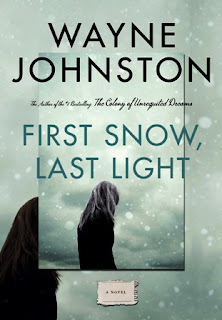First Snow, Last Light
Award-winning
author Wayne Johnston was born in the small town of Goulds, Newfoundland. Like so many from Atlantic Canada - has tracked his heritage to both Scotland
and Ireland.
“I
have traced myself back to the people sent from Scotland to Ireland after the
clearances,” explains the mild-mannered writer over the phone. “We were then sent
to County Antrim. So, my people would have started out Scottish and then
intermingled with the Northern Irish.”
Although,
today, Johnson is household name in Canadian literature, writing was not always
on his agenda.
“I
started out - as was suggested to me by both my parents and our parish priest
where I grew up - on the path of priesthood,” he scoffs. “In high school I
realized that was not what I wanted, so I cooked up the idea of being a doctor
instead.
“Then
it became time to start medical school, and I realized I didn’t want to do that
either. I had to break the news to my parents that it wasn’t going to be in the
priesthood or in medicine. I told them I was going to be a writer - because I
always wanted to be one - and they didn’t really know quite what to make of
that. There was no such thing as a ‘writer’ in our world; there were books, but
we didn’t know anyone who wrote them.”
After
graduating with degrees in English Literature, Physics, and Chemistry from Newfoundland’s
esteemed Memorial University, Johnston began working as a reporter for the
Daily News in the province’s capital city of St. John’s before making the move
to fiction writing.
“I
wanted to get a broadcasting job, instead of a print job. I got accepted into
Carleton’s School of Journalism in Ottawa. Then I thought, if you get a
comfortable job with a nice, stable income, what are the chances you will ever
become a writer? So I got off the bus, called admissions at Carleton and told
them I didn’t want to position they were holding for me and that they should
give it to someone else. Then I used the money from my student loans to buy me
some free time to write a book.”
Ten
works of fiction later, Johnston has just released First Snow, Last Light, the third instalment in his ‘Newfoundland’ trilogy,
which includes the brilliant The Colony
of Unrequited Dreams and its equally-stirring sequel The Custodian of Paradise. It is a family mystery that brings back
one of the scribe’s most beloved characters, Sheilagh Fielding.
“In
the first and second books, many aspects of Sheila’s life were not resolved. An
example is the question of whether or not Sheilagh will eventually find what she
has been looking for - personal happiness. She has always been the sidekick of
a man, but not a wife. Not that you need that to be happy, but she lives a
lonely life. Even the idea of having a close friend appeals to her, but she
doesn’t have any.
“My
goal was simply to tie up some loose ends with this work.”
The
story also follows Ned Vatcher, a 13-year-old boy who comes home from school to
find his parents missing. The character required Johnston to do some serious research.
“Ned
is based on the guy who built a TV empire in Newfoundland, Canada, and parts of
the United States. Television was the quintessential invention in the 19th
century, so the challenge was to convey that, and his impact on people’s lives,
in the most literary way I could.”
First Snow, Last Light is already being lauded by
both critics and readers as one of the scribe’s finest efforts.
“It
has been very well received. It has been on the Bestsellers list ever since its
release, and it still is. It is also number five in Hardcover Fiction in Canada
right now. It’s my bestselling book since The
Colony of Unrequited Dreams.”
Next
year will be equally productive, as Johnston has nearly finished yet another
narrative.
“This
new book is a bit of a departure for me. It starts out in Newfoundland, but it
moves to South Africa, Amsterdam, and several parts of Germany. My wife is from
South Africa, so I have been there a few times. It took me years to feel
comfortable about setting a book there. It is not set there in the sense that I
am writing from the point of view of South Africans; I am writing from the
point of someone visiting from Canada.”



